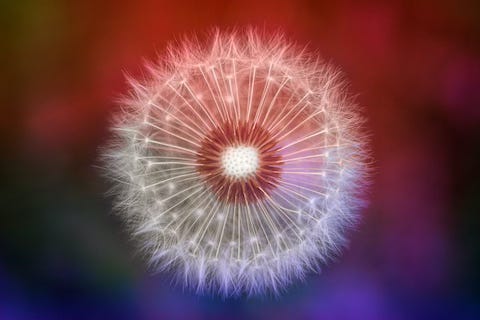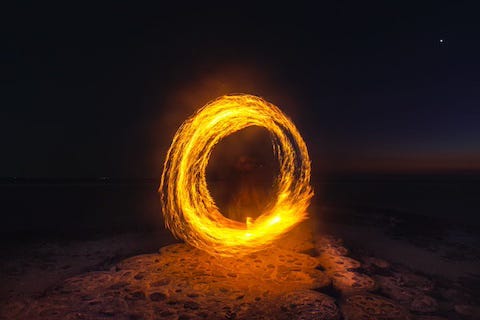“Every form of addiction is bad, no matter whether the narcotic be alcohol, morphine or idealism.” ~ Carl Jung
When I started my journey of recovery in September 2014, I have soon realized that although my life seemed very functional on the outside - to the point where most people who knew me well were surprised and asking me if I am absolutely certain that I have a drinking problem - I was dead on the inside. I may have not been able to fully relate to those addicts who lost their jobs, their friends, their children, and homes due to the addiction - and it is not to say that we should ever compare to anyone else, especially in recovery - but I could relate to every single person with addiction when they would say that there was a dark hole deep inside of them that needed to be fed regularly, and that never was satisfied and full. I used to say that I was spiritually dead. Now, almost ten years later, that statement makes even more sense than back then. And, if I have continued drinking and using, I still may have not been dead or homeless to this day, but I am certain that I would have been even more empty inside - if that was even possible.
Addiction, as I see it and as defined sometimes in non-medical circles, is a loss of connection with the higher self, the inner most deep sense of our soul - a loss of connection with the universe, a higher power, great universal consciousness, or god/goddess, if you will. Trauma has been seen as the core dynamic of most addictions. Trauma, that caused the pain that we want to dissociate from, avoid by all means, and find a relief from, so we self-medicate. I am sure not all of you will agree with this view, and that is ok. There are many ways to define addiction, as well as there are many paths to recovery and wholeness.
Recovery, in the sense of how I see it here, would then be to recover, retrieve, to take back, that long-lost connection with that something which was always there inside of us, and which we seemingly have lost. We have always had that inner deep part inside of us - the soul - and we have always been part of something bigger and greater. However, the connection between who we appear to be in the world and that sacred part inside of us (which is who we really are) may have been ruptured in the process of coping with life, avoiding pain, and simply trying to survive.
“We are not human beings having a spiritual experience. We are spiritual beings having a human experience.” ~ Pierre Teilhard de Chardin
I am absolutely certain that addicts, just like other humans - if not more - have a high degree of spiritual desire. The problem, however, is that we don’t know how to get there, how to reach it, connect with the spirit. Instead, we take many destructive and unskilful routes - detours, practically - that end up deeply harming us in the end. Often I hear addicts saying that they never got the manual on how to live life; certainly not how to have healthy relationships with themselves and others. Most often, addicts would dislike, or even hate, themselves and, naturally, the connection with their spiritual side, with their most deep inner self, would be cut off. And, so, it makes sense that instead of choosing more soulful, nurturing, skillful ways to be connecting to the higher spirit - since we never learnt how to do that - instead we choose the spirit in the bottle, drugs, sex, food, gambling, shopping, work, internet, or the biggest of all - codependency. Codependency seems to be the one thing that probably every addict struggles with - only feeling good about ourselves when, and if, we receive love, affirmation, validation and acceptance from someone outside of us. Since we cannot become our own mirror, we, therefore, need someone else to mirror us back to ourselves.
Carl Jung developed the theory of psychological “archetypes” - which could be defined as differing but repeating patterns of thought, statements, and behaviors that re-appear in time across people, countries and cultures. In his work with patients who struggled with alcoholism, he recognized an archetypal need for the “wholeness” that, in his words, comes from a conscious contact with a Higher Power.
In his letter to Bill Wilson, the co-founder of the Alcoholics Anonymous (AA), Carl Jung replied, "[His] craving for alcohol was the equivalent, on a low level, of the spiritual thirst of our being for wholeness, expressed in medieval language: the union with God… You see, ‘alcohol' in Latin is spiritus, and you use the same word for the highest religious experience as well as for the most depraving poison. The helpful formula therefore is: spiritus contra spiritum." The phrase “spiritus contra spiritum” expresses the view of using spiritual experience against the addiction of alcoholic spirits. The treatment - the solution, if you will - would be of a spiritual nature since a spiritual problem cannot be resolved with a material remedy.
“There is within every human, or so it would seem, a need for the divine… That is to say, the craving is normal - the craving for certain kinds of elation, for a certain sense of 'specialness,' for heroism, for cessation of pain. And, underlying all of those, really, ultimately, and most powerfully, is the seeking of a sense of 'meaningness.'“ ~ Dr. Jeffrey Sadinover.
In my experience, no matter which recovery program I have attended, they all had a certain element of spirituality (I am not talking about religious aspects here) in them - while AA relies strongly on prayers and most of them are borrowed from Christian practices, Buddhist approaches (Refuge Recovery, Recovery Dharma, Eight Step Recovery, to name a few) rely on practices of meditation and mindfulness, instead. The important thing is that you choose what feels right for you. And sometimes, you will have to try different ones in order to find what works. I have spent a few years in AA, and it helped me enormously - especially with the presence of its loving community and the step-work that it suggests, which helped me dive a little deeper in my addiction. However, there was a point in time where I have realized that Buddhist approaches fit me more, and I rarely attend 12-step meetings these days. You know, we change through time, and it is expected - if not even, highly encouraged - to change in our preferences, values, belief systems.
There have been several attempts to combine a 12-step program and Buddhism (or some other Eastern philosophy). Ashok Bedi, a Clinical Professor in Psychiatry and a Training Analyst at the Jung Institute of Chicago, offers his explanation of the 12 steps of AA. In his online course, The Spiritual Paradox of Addiction, he briefly explores each of the 12 steps through the Eastern, Jungian and neuroscientific lens. The steps, as he puts it, include making a confession of powerlessness, surrender to a higher power, making a searching moral inventory of our character, cultivation of the observing ego that accepts accountability, developing reflection before action, humility, knowing who we’ve harmed, making amends where it’s appropriate, maintaining the personal inventory, praying and meditating to know God’s will, repaying your debt to the community through service.
Another attempt in “marrying” the 12 steps of AA and an Eastern philosophy has been done by Kevin Griffin. Kevin is a longtime Buddhist practitioner and 12 Step participant, an author, and one of the founders of the Buddhist Recovery Network. I enjoy Kevin’s online meetings very much and find his wisdom and experience very practical and applicable in my personal life. He wonderfully combines Buddhist mindfulness practices with the emphasis on staying in the present moment, with a 12-step recovery program and its motto of taking things “one day at a time”.
Sometimes, we tend to think that the goal of recovery is simply to remove the crutch, replace it with something else - a more healthy habit, or a spiritual or religious practice, for example - and therefore alleviate the pain. But that is not all. That is just a beginning - learning different, more spiritual responses to cravings, and removing the addictive ones. The overall goal of recovery, in my opinion, is to become who we are meant to be, who we have always supposed to be. The overall goal is to become a whole, integrated individual. And I don’t know what that looks like for you. I only know what that feels like for me.
In the past, I couldn’t really imagine what I needed, I only knew what I wanted. Then, in recovery, I have finally discovered and realized that it was never about what I wanted, but what I needed. What I wanted was connected to my ego self, my small self. What I need - really need - is completely something else, it is related to my soul’s desire, and it is certainly better for me to follow that path, than the small self’s one. The psyche (which means “soul”) has a much larger perspective on our lives. It can imagine so much more for us than the ordinary ego can ever grasp - which is where the difference between wanting and needing lies. Really, what we all need is a real, deep, authentic connection to the higher self, the higher power (regardless of how you may understand it), the inner most deep part of you - your soul.
“Wholeness is not achieved by cutting off a portion of one’s being, but by integration of the contraries.” ~ Carl Jung
Life is often a struggle, and it brings new challenges and difficulties every day. It can be extremely sad, outrageous, and terrifying, at times. But, life itself is not an illness to fight, and it’s not a problem to fix - especially not our personal problem. It is a journey. And, it is up to us to make that journey more interesting (interesting doesn’t always mean pleasant!). This life is full of opportunities for new experiences, as we never arrive anywhere. There is no destination. I am not suggesting that we are to be unaffected by the unfairness and injustice in it, and, at the same time, we are not to be overwhelmed by it - but rather I am suggesting that we take a bite of it, in our own very authentic way. And then, if we are doing things that are right for us, that make sense to us, then, from time to time, we get to experience an overflow of this amazing emotion that we call happiness. And, be careful, as it can be highly addictive - we need to remember that it is only a byproduct and it is highly transient. There is no formula which if you follow precisely you’ll get to be happy - always and once for all. It is about the purpose, meaning, calling, the inner sense of satisfaction - these have much longer role and presence in our lives than those fleeting moments of happiness.
So, maybe, instead of asking what you have to do in order to be happy, let’s ask how are you showing up for yourself daily? Is the way that you are showing up in your life coming from something deep inside of you, or is it affected and tainted by your fear of what will people think and say? Does the way you show up in the world align with or make sense of your experience? Does the value, belief, practice, or your expectation take you deeper into life? Does it open new possibilities for relating, and is it compatible with the deepest fluctuations of your own soul?…
When our lives had been reframed - and this is the case with every addiction - and when we had seen them as fear driven, petty, repetitive, meaningless, painful, disastrous, terrifying… we either anesthetize ourselves, distract, or realize that something has to change significantly. Sadly, for addicts, it usually takes a while before change happens. Regardless, something deep inside of each of us always knows when we are shirking until we can fit ourselves into the smallest box, when we are avoiding our life, skipping opportunities, delaying moments, rationalizing actions, justifying behaviors, excusing… As Carl Jung once said, “Life is a luminous pause between two mysteries that are yet one”. Our task is to make that pause as beaming and sparkling as possible. Recovery is a way of finding meaning in our lives, again.
This may not mean much to you if you are at the very beginning of your recovery journey. I know I wasn’t ready to hear this. But, there will come time when you will understand and appreciate this. I hope it is soon.
“In every adult there lurks a child – an eternal child, something that is always becoming, is never completed, and calls for unceasing care, attention, and education. That is the part of the personality which wants to develop and become whole.” ~ Carl Jung
As always, I am grateful for your subscription! If you feel inspired or moved, if you feel seen or heard, or you find it relatable you can offer me a tip! PayPal me or Venmo me. You can also upgrade your subscription to a paid membership. Until next time!
Stay safe. Marina









Nice!!! I’ve explored the “spiritus contra spiritum” line in the infamous letter as well. I feel it is the keystone of recovery. AA would not exist had a Roland H. Hazard never went back to Switzerland to visit our dear Dr.!!!
Great article!! Very Well done!!